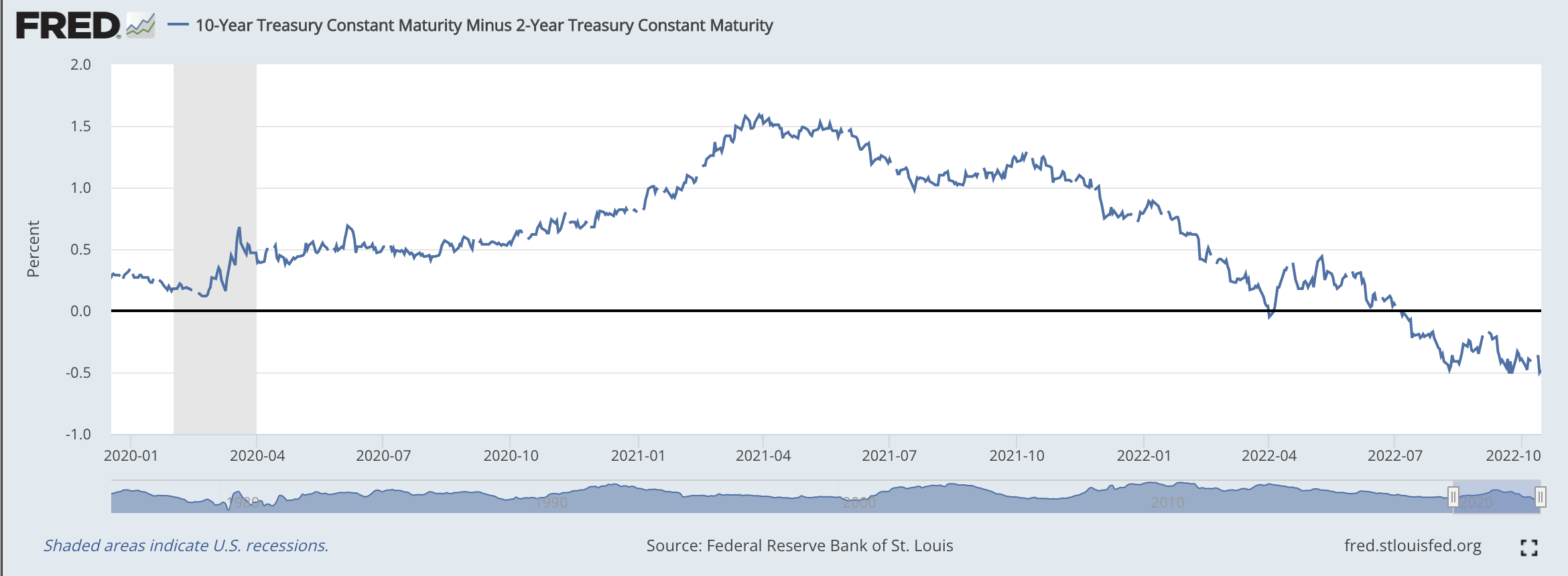What the ongoing yield curve inversion is telling this investor
It was a feature in every headline earlier this year, but it seems to have slipped away as financial markets turned their attention to other concerns. But we cannot ignore it - the US 2s/10s yield curve inverted earlier this year and is still inverting. The correlation has been a reliable predictor of a recession in the past. The inversion that started in July is currently the deepest since June 2000. And at minus 50 basis points, it's not looking like the recovery is coming anytime soon.
Look away: The US yield curve inversion

So what is this all saying to Adam Grotzinger at Neuberger Berman?
In this, the final edition of this series of Expert Insights, Grotzinger tells us what the yield curve inversion narrative means to him - and why the headlines tell an incomplete story. Later, we'll delve into the role government bonds are now playing - and what it will take to earn their "safe haven" title back.
EDITED TRANSCRIPT
LW: What is the risk that central banks will be forced to hike into a recession?
Adam Grotzinger: That is a real concern, right? And central banks don't have any greater clarity on the four directions of economic realities, and they are acting with the effects of monetary policy, which has been extraordinary this year. We started the year with the market expecting the Fed to do 100 basis points, we're now going into likely our fourth 75 basis points sequential rate hike from the Fed, which is that those effects are lagged in terms of their impact on the economy.
So there's a desire, they may be over hiking, they are in above neutral territory, they're in the restrictive territory, but there's also a very conscious desire by the Fed, in particular, to squeeze out inflationary dynamics. It's purposeful that they're doing restrictive territory, and it's purposeful that they want to see, or at least they're communicating in their rhetoric, they want to see some economic pain as a result, to lessen the demand that is creating and stoking some of this inflation.
LW: How are you interpreting the ongoing yield curve inversion?
Adam Grotzinger: It says the market's concerned about growth, concerned about the effects of too tight monetary policy, the speed in which we've adjusted rates, concerns around economic data, and some soft points that we're already seeing in data prints. But there are other factors there, there are other factors that are more technical, and there are many buyers of long-duration bonds that are liability-driven investments.
So you can't take the shape of the yield curve as the sole determinant of recession, no recession, or the shape of growth going forward, but it's a factor we need to watch and pay consideration to, in addition to other things that we want to watch:
- What are corporations telling us?
- What's happening in quarterly earnings?
- What is management guidance?
- What's happening to margins?
So it's one piece of the overall puzzle, but it's an important piece to watch, and it's telling us that growth looks more vulnerable.
LW: What is current pricing telling you as a professional investor?
Adam Grotzinger: It's telling us that bond markets, for the most part, barring idiosyncratic country dynamics, like the UK, where there's more concern around policy and its efficacy, but in the US it's telling us that the markets believe that the Fed will accomplish its objective, medium, long term, which is to control inflation and bring us off of these high levels of inflation that we've been having. So there's still a belief in the efficacy of central banks, in the manifestation of how you're seeing that in longer data government bond yield pricing.
LW: Why should government bonds not lose their "safe haven" title?
Adam Grotzinger: I think what we're going to go through now in the market is something where it's less a broad brush of a developed market, an emerging market, degrees of risk, and it's more country-specific. What policies are being enacted? How is monetary being run versus fiscal? What degree of indebtedness are these countries taking on? Is that a solvent position for the sovereign? A lot of questions will be asked, but I think more on an analysis of a country-to-country basis and bond pricing as a manifestation of that, and bond vigilantes showing their hand where they disagree that those policies are going to be effective in nature.
Learn more
Neuberger Berman's global fixed income capabilities enable them to offer investors a multi-sector fixed income solution with a strong focus in generating durable income. Find out more here.
2 topics
2 contributors mentioned

